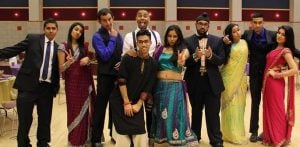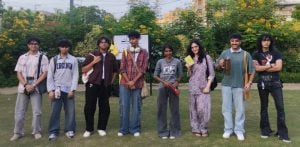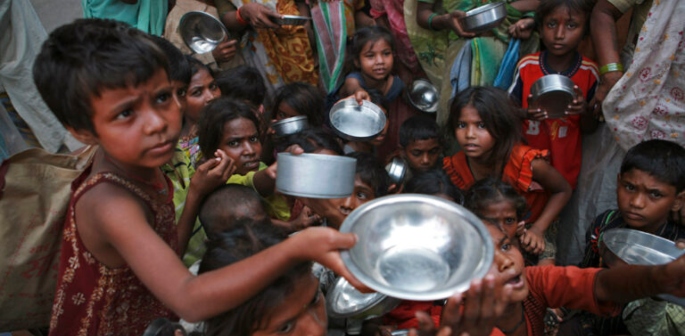"When the police arrest beggars, beggar masters pay bribes"
Although begging in Pakistan is illegal under the West Pakistan Vagrancy Ordinance of 1958, the boom in the number of beggars means the law remains largely abandoned.
There are up to 25 million beggars in Pakistan, with numbers growing particularly in urban areas such as Karachi.
It’s no surprise that much of the population resort to begging as their only source of income due to the poor living conditions and a lack of economic alternatives.
Those begging includes men dramatically dressed as women near traffic lights and sad-looking mothers desperately cradling their babies.
It’s almost impossible to sit in a parked car without being approached by a group of orphaned children or a lonely old man with missing limbs.
This is because beggars in Pakistan come in different forms and use distinct tactics to attract people.
While some aim to entertain, most appeal to human sympathy.
Needless to say, it’s not a pretty sight to see, however, what’s even worse is what takes place whilst nobody is looking.
The reality is that these individuals are not as pitiful as they may appear to be.
In fact, some beggars are victims, not of poverty but of crime.
The more sympathy people have for beggars, the more money the latter actually make (or at least their bosses).
Of course, this is not to distract from the fact that Pakistan has a serious poverty problem.
Issues of hunger, dehydration, child labour, illness, rape and financial exploitation are the real experiences of approximately 20 million Pakistani individuals.
So, begging is a legitimate way of survival for many of them.
The situation is so normalised that people have capitalised on it and this is where the issue begins.
How Pakistan’s ‘Begging Mafia’ Operates

The very nature of beggary has evolved over time from an innocent survival strategy into a lucrative business opportunity.
Begging has become a form of organised crime where criminal networks force people into begging.
The groups that arrange these illegal structures are more famously known as the ‘begging mafia’.
Their motivations to beg differ drastically from those of the poor.
Rather than begging out of need, convenience or preference, the begging mafia chooses it as a professional career.
This is because begging is relatively profitable in comparison to other occupations such as domestic work.
On average, a child domestic worker makes an estimated Rs. 500-1500 (£2-£16) per month.
Whereas beggars can make between Rs. 100 and 10,000 (46p-£45) daily.
Thus, begging is more profitable than being a nanny, cook, driver or gardener in Pakistan.
Making Begging an Industry
The mafia bosses, of course, never beg themselves. Instead, they can kidnap children by impersonating social workers, faith leaders and even orphan caregivers.
At times they heartbreakingly offer sweets in exchange for life as a child slave.
Adults, on the other hand, maybe drugged and enslaved for economic gain through the threat of mental and physical violence.
If a beggar is too ‘healthy’, disabilities and defects are forced upon them.
For example, children and seniors deliberately have their limbs abnormally twisted or removed, leaving them crippled.
In addition, women are raped and impregnated in order to maximise ‘profit’ in this devasting web of deceit.
This is to deceive the public. Seeing physically impaired children and distressed mothers can cause the toughest hearts to melt and, in turn, donate.
Beggars are then taught begging tactics such as where and how to beg effectively to maximise donations.
Children may learn rapping in English to attract foreigners. Using lyrics like “buy one flower, take a flower, give me 10 rupees” is a tactical formula to humour their audience.
Assistant Director for Bureau of Statistics Punjab, Waseem Abbas mentions another tactic to exploit the young:
“There are also organised gangs who deploy child beggars in lucrative spots like bus stops, traffic signals and markets.”
The introduction of digital begging where individuals beg via calls, texts and emails emphasise the evolution of this illegal industry.
However, these phones also track the beggar and warn them of nearby police, highlighting the criminality behind this ‘organisation’.
The most absurd aspect of it all, however, is that some beggars do not get to keep all their hard-earned money.
These devastating tactics raise the question of how such an unjust system is even able to thrive.
So, what are the factors that encourage the begging mafia to prosper?
Corruption

Pakistan’s poor political conditions allow the begging mafia to comfortably maintain and grow their criminal networks.
Where the government is weak, criminal activity is strong.
Out of all the sectors in Pakistan, the police consistently ranks as the most corrupt division.
Beating out power, health, education, land and judiciary.
Many argue that this ranking holds true in the face of the begging mafia where police officers remain largely complicit.
While most politicians and police officers want to eliminate begging as an organised crime, some officers are a part of the ‘begging ring’.
Some officers contribute more directly by allowing the mafia to occupy territories, illegally use electricity and offering protection in exchange for money.
Ayesha Khan, a social science worker in Karachi, Pakistan, dived into this further, revealing:
“Police officers are said to be taking bribes, in some cases up to 50 per cent, cut from the beggar’s income.”
She goes on to perilously report:
“The amount of the bribe depends on the locality; higher amounts have to be paid to police officers in posh localities.
“When the police arrest beggars, beggar masters pay bribes…and get their beggars released.
“In cases when the police raid and arrest beggars, influential people, including ministers, make calls and pressurise police officials for the release of captured beggars.”
There is no doubt that some police officials have given the begging mafia a safety net to operate, jeopardising more lives.
No Government Intervention
Pakistan’s refugee crisis is also contributing to the issue as it has burdened their economy.
Besides, an increase in homelessness and, as a result, native beggars, incoming refugees are begging due to a lack of government support and financial difficulty.
In March 2021, Syrian refugee Muhammed Ali was seeking a life away from his war-ravaged country and travelled to Pakistan on a visa visit.
The treatment since Ali arrived in Pakistan has emphasised the contradiction of the begging ‘industry’.
A Syrian diplomat exclaimed:
“Ali cannot beg or ask for financial help in Pakistan.”
“It is a violation that should be considered as a crime.
“If someone commits this crime, he should be arrested according to the law and deported immediately.”
Ali has avoided confrontation from the Pakistan government directly.
The government’s lack of intervention means refugees must beg.
Refugees have to worry about deportation and survival, whilst the mafia undoubtedly preys on them.
Above all, however, is that there are no implemented government laws that will put a stop to the begging mafia.
The lack of enforcement of pre-existing laws, like the 1958 Ordinance, and the absence of new legislation to tackle a rapidly growing industry contributes to criminal production.
From a polarisation perspective between the rich and poor, pragmatic steps need to be taken and enforced.
This is the only way to prevent the exploitation of beggars and the prospering of the mafia.
To date, the begging mafia has not suffered enough punishment for their criminal behaviour.
The mafia believes the pros of beggary outweigh the cons and at this stage, the government have given no reason for them to believe otherwise.
Targeting the Vulnerable
Like most institutions, there is a hierarchy in criminal organisations.
Within the beggar ring, the ‘beggar master’ is the top dog, then followed by ‘middlemen’ who exploit vulnerable individuals, typically from disadvantaged social groups.
These groups include those who are young, poor, disabled, seniors and third gender.
Those who do not fit into the listed categories are forced into them using inhumane methods so they can receive sympathy.
Children
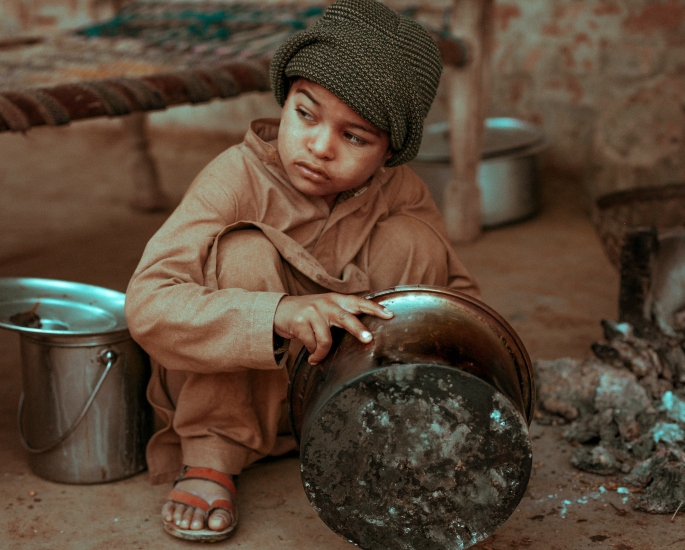
Kidnapping children, often younger than the age of ten, is one way the mafia keeps their business running.
Pakistan has a large street child population, and as the population increases, so does the number of potential child beggars.
According to the Consortium for Street Children (CSC), there are an estimated 1.5 million street children in Pakistan. Alarmingly, this number is still increasing.
The availability of these children make them easy victims and their vulnerable positions deem them favourable.
For example, those targeted are street kids who already work out in the open as flower sellers, trash pickers, and shoeshine boys.
Even child workers as young as ten become housemaids but these occupations can come with horrific consequences.
In August 2019, the torture and murder of 16-year-old Uzma Bibi by her employer for helping herself to a piece of meat emphasised the lack of safety and regulation regarding child labour.
Another formidable case was that of 10-year-old Tayyaba.
Frightful pictures of her bruised and blood-covered face went viral on Twitter in 2016 after working in the home of a judge and his wife.
Causing an outcry in Pakistan, this showcased the danger for many mistreated children as they yearn to provide for themselves and their families.
Exploiting the Young
Child rights activist, Fazela Gulrez says despite there being a law and people voicing their opinion, the exploitation of the young fall on deaf ears.
“No amount of outpouring of support on social media on an issue of this kind translates into any far-reaching positive results in Pakistan.
“The most that happens is a law is passed with much fanfare, which looks very pretty… but changes nothing on the ground.
“The immediate reaction could be intense but remains temporary. So, in reality, nothing has changed.”
Occupations such as a maid or servant should be a safe haven for poverty-stricken children. Yet, they just reinforce the idea of exploitation.
This makes it is easier to accustom children to a criminal lifestyle when they begin working at a young age because they forget the value of self-development and education.
Approximately 22 million children are not in Pakistan’s education system.
This lack of structure and knowledge forces the child to compete with adults in intensive circumstances, exposing them to a life without guidance.
Such ideology brainwashes kids into thinking ‘what’s the point of studying if I am making easy money without it’.
It encourages them to stay in this line of work because it’s all that they know.
The Disabled and Elderly
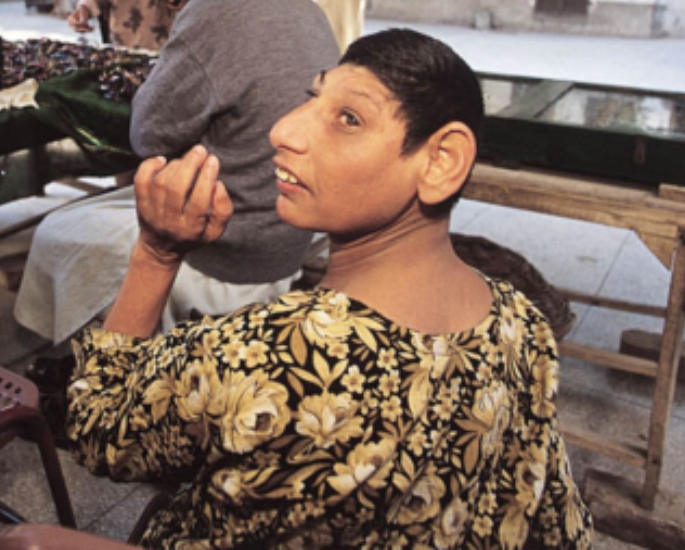
The reason for targeting the disabled, elderly and ‘third gender’ (transgender) is relatively simple; the mafia wants to target people that already look pitiful or intriguing.
As mentioned above, beggars suffer from ‘alterations’ when they do not appear to be genuinely poor or in need.
However, this process is inconvenient even for the begging mafia.
They would rather target people who do not require any physical modifications.
Thus, the disabled, elderly and third gender are precious to begging gangs as the two former groups attract empathy. while the latter entertains.
Among the disabled, those suffering from microcephaly are particularly desired in the city of Gujrat.
These individuals suffer from a genetic disorder where they have a shrunken skull.
They receive the name ‘chuhas’ (rats) after their appearance and attract donations from most visitors.
Legend has it that infertile women can have children if they visit the shrine of Shah Daula and donate to the ‘rat people’.
Although upon birth, they must give away their child at the shrine or else future children risk looking like a ‘rat’.
The begging mafia then ‘modify’ these children into ‘artificial rats’ by having an iron rod restricting the growth of their heads.
They are then subject to isolation, never to meet their parents again.
The only interaction they are able to have is when other visitors donate money to their begging bowls.
Many believe that ignoring these ‘rat children’ will bring devasting luck.
So, numerous individuals give the children coins and notes to the delight of the mafia.
Poor Parents and Guardians
Poor parents and guardians living in rural areas migrate to urban cities of Pakistan for a better quality of life.
However, it is these exact cities that will only make their lives more difficult.
Upon arrival, their limited educational skills make them virtually useless in competitive industries.
Instead, the begging mafia exploits the parents by deceiving them with fake apprenticeships or education schemes for their children.
Their lack of knowledge and experience on these topics makes it difficult for them to distinguish between real opportunities and scams.
The parents simply want their children to lead a better life than they did, but unknowingly commit themselves and their kids to a life of begging.
Other parents with low economic status may find living costs to be impossible in urban areas.
Therefore, these parents willingly sell their children to the begging mafia as their only means of escaping poverty.
Despite the expectation of payment, however, the begging mafia frequently neglects to pay the expected amount, forcing parents to beg alongside their children.
‘Third Genders’

Like those referred to as the ‘rat people’, people ridicule and marginalise third genders (‘hijras’).
Rejected by their family and wider society, they end up on the streets.
Hijra refers to those who are transgender, transvestites or hermaphrodites.
Ayesha Khan details that although outcasted, hijras make a lot of money.
They attract donations through entertainment like performing blessings and singing:
“Hijras in Lahore have formed dancing groups and signboards of their groups are visible in the red light area.
“They remain busy with their embroidery work in the daytime and in the evening they perform in weddings and other private functions.
“They are experts in designing and embroidery (zari ka kam) for bridal wear.”
Frustratingly, this superiority within begging comes at a price.
Most hijra groups have a chief known as their ‘guru’ who takes 50% of the group share.
Then, 25% goes towards the group’s accommodation bills, with another 25% split between the other hijras.
It shows how the begging industry relies entirely on a pyramid power structure.
Those ‘lower’ in society become entangled within a life of criminality, with their ‘salary’ serving as payment to those who can abuse or even murder them.
Cultural Public Generosity
Like some other countries, manners, etiquette and generosity are a primary focus in Pakistani households.
Most children learn the importance of hospitality from an early age, by witnessing their parents’ friendliness towards the people around them.
For instance, it is unlikely that families visit one another without bearings gifts that express their gratitude for the invitation.
Presents such as food, clothes or household items are common offerings.
Nevertheless, the value of generosity is not specific to family and friends only, it also transgresses into the world of beggary.
The Stanford Social Innovation Review reported that Pakistan contributes more than 1% of its GDP to charity, making it one of the most charitable countries in the world.
The report also indicates that 98% of the Pakistan population helps those in need, with most donations going hand to hand.
It is possible that people are more charitable culturally due to their faith, spirituality and beliefs.
Religious practices such as ‘Zakat’, particularly during the month of Ramadan, encourages Muslims to develop these giving qualities.
Of course, while the intent of ‘Zakat’ is not to legitimise illegal begging, it does so indirectly.
In many ways, beggars are dependent on it to sustain their job.
This is because the begging mafia takes advantage of these cultural and spiritual sentiments.
People who appear religious regularly become targets because of their generosity and charitable nature.
Albeit, it is the giver’s responsibility to ensure that a beggar is a genuine person in need.
Most people will donate blindly because the image of a Pakistani beggar conveys need and desperation.
The Beggars Trap
When numerous beggars use similar tactics, it’s difficult to differentiate who is begging out of desperation or for criminal organisations.
The irony is that most Pakistani citizens are aware of this exploitation.
Although they still donate under the false impression, it will make the beggar’s life easier once they return.
The reality, however, is the complete opposite. This misconception is actually funding the criminal industry.
It’s important to recognise that donations trap beggars under a system that oppresses them.
Thus, government laws and regulations, as well as public and opinion needs radical change.
Without a change in these two departments, the begging mafia will continue to enslave innocent people and ultimately criminalise them.
Overall, the begging mafia has had a negative impact on a cross-section of people, including the poor and vulnerable
It is an area, which the government and civil society organisations should closely monitor and tackle.
Constant creative, educational and informative initiatives are the need of the hour.











